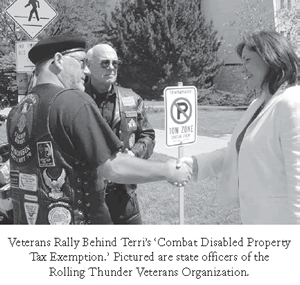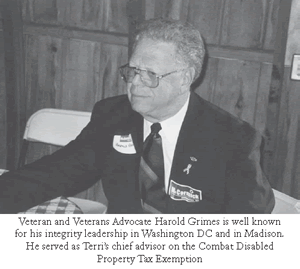Sometimes the most difficult part of my job was being able to do my job.
 The year was 2006, and I was receiving more push back than usual on a veterans property tax bill that I wrote, with the help of Harold Grimes, a highly active and distinguished Vietnam veteran. The bill would have provided property tax relief for our returning veterans from Afghanistan and Iraq, as well as other veterans, with a 100 percent combat disability. The subject was clearly property tax relief, yet in a matter of a few hours after the bill’s introduction, the focus changed.
The year was 2006, and I was receiving more push back than usual on a veterans property tax bill that I wrote, with the help of Harold Grimes, a highly active and distinguished Vietnam veteran. The bill would have provided property tax relief for our returning veterans from Afghanistan and Iraq, as well as other veterans, with a 100 percent combat disability. The subject was clearly property tax relief, yet in a matter of a few hours after the bill’s introduction, the focus changed.
The junior speaker shifted the focus of the Veterans Property Tax Relief to protocol—the newer protocol—and worse, the debate unraveled to its core. The real issue again was who would get the credit for writing my bill? This bill had—and still has—the support of veterans, as well as a number of political figures. Yet the leadership clique appeared to be creating excuses in an effort to block what would be an important and historic bill for the state. Instead of discussing the bill, the front row decided to block the veterans bill from being heard in committee.
The response from the veterans community was immediate and it was clear. Stop playing games with veterans or we will march on the capitol. The constituents who lobbied for veterans property tax relief were the sons, daughters and wives of veterans, and they were the veteran community at large. They were all asking for status reports and updates from my office. The veteran lobby was well organized, and they were on the move on the Internet and on the telephones. How could I go back to them and explain that their bill hadn’t been considered because the front row stalled the legislation for no apparent reason? These men and women in uniform were reminiscent of my family—my grandfathers, father, brother, nephews—veterans all. These were the men and women who made my service in the legislature possible and my nation’s freedoms possible.
 How could I go back to these individuals and tell them that the front row had threatened me so I would drop the ball? I couldn’t.
How could I go back to these individuals and tell them that the front row had threatened me so I would drop the ball? I couldn’t.
When I began the draft of the Veterans Property Tax Relief Bill, I brought in attorneys and veterans with personal experience on the issue. It was at Harold Grimes’s (USMC and U.S. Army, retired) request that I first wrote the legislation. The stories of disrespect and neglect of our Vietnam veterans was and is not a history I want to see repeated. It was for their cause—their banner—that I went to the wall in my caucus. It was their plea that I carried in my heart and fought to be heard. A sacred prayer of the veterans from the Korean and Vietnam wars was that their dishonor and neglect at the hands of the American government would not be the legacy for the veterans of today, from Iraq and Afghanistan.
Maybe it would have been easier to understand if the debate on veterans property relief had been partisan. But it wasn’t. Instead, it was my own party’s leadership in the front row, blocking the bill from being heard. The entire veterans community saw dishonor in the actions of my party. In fact, with the war raging in the Middle East, the veterans community saw disgrace as well in the actions of my party. Sadly, so did I.
When I relayed the unhappy news to the veterans groups, they sprang into action. They, as a force, insisted that my party’s speaker allow their bill up for a vote. They e-mailed, wrote letters, made phone calls, and tried every way they could to lobby their own state senators and their own assembly members—all to no avail.
I polled members of both parties on the Veterans Affairs Committee and the vast majority were in favor of the Veterans Property Tax Relief Bill. However, the chairman of Veterans Affairs would not budge; his staff was instructed by the front row not to allow it up for a vote.
The message was clear: “Do not let McCormick’s bill out of your committee.”
Phone calls by an active veterans citizenry caused the junior speaker to transfer my bill under someone else’s name into someone else’s committee. These all-too-familiar political tactics were not a match for the veterans community, who were determined to see a bill that would keep veterans in their homes and off the streets passed through committee and written into law. The new committee chairman who was told to sit on the new Veterans Property Tax Exemption Bill was less able to take the heat from the several hundred phone calls he would receive from veterans across the state to bring it up for a vote.
As luck would have it, the new committee chairman was the same individual with the booming voice that had threatened me for standing up for our sitting Republican governor in his reelection bid in 2001. Five years later, this guy was still following orders from the same junior speaker, only this time, he was standing in the way of passing a veterans property tax exemption for 100 percent combat-disabled veterans coming home from the wars in Iraq and Afghanistan. It was the same cast of characters—a political class occupied seemingly by children who desperately wanted to be somebody. Only this time, they were taking on a group of individuals who’d earned their stripes and could not be intimidated—the veterans of the United States military.
Democrats on the floor of the assembly tried their best to embarrass my party leadership. They called for a “pulling motion,” a motion to pull my bill out of the committee that was not allowed to hear it and up to the floor of the legislature for a vote. My side of the aisle grimaced and groaned. Instead of swimming against the political current to do the right thing, the majority of members on my side of the aisle sat motionless and did nothing. They pretended as though nothing unusual was happening, as though they were watching a movie and no one else was in the room. The browbeating by the front had so paralyzed the committee members to stand for their own bills that it was like a scene from the movie Redemption. No one felt compelled to stand up and speak what was on his or her mind.
There was a hidden agenda to the public…To continue reading this book, get your copy of “What Sex is a Republican” in paperback or Kindle edition on Amazon.



